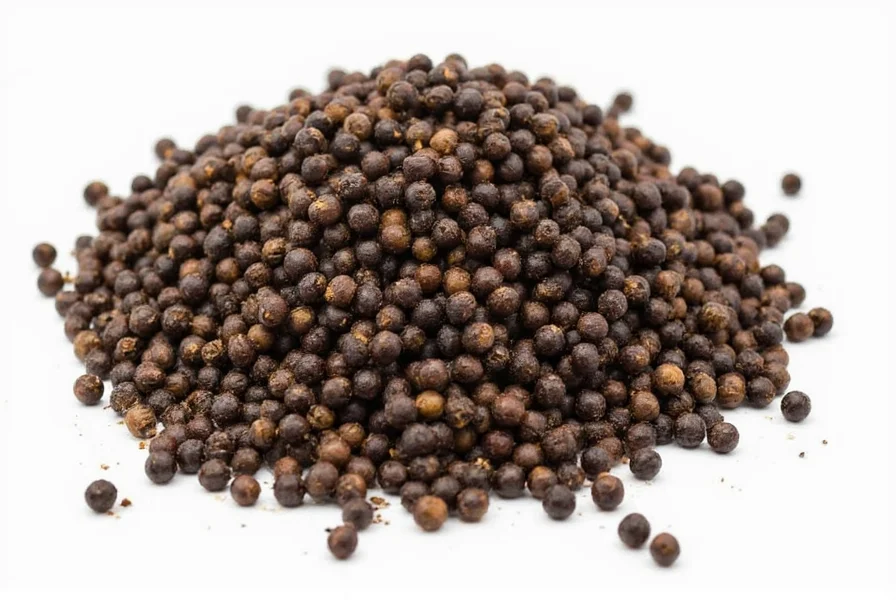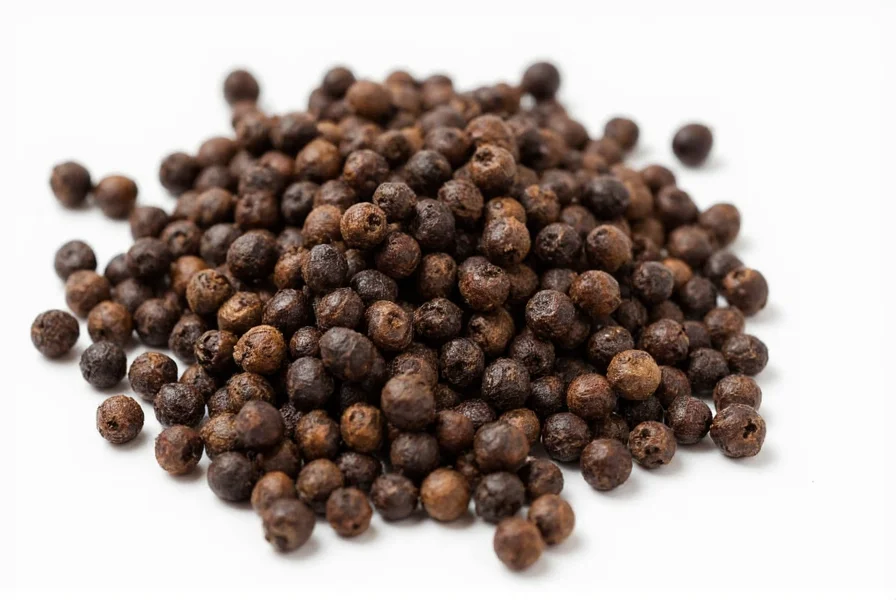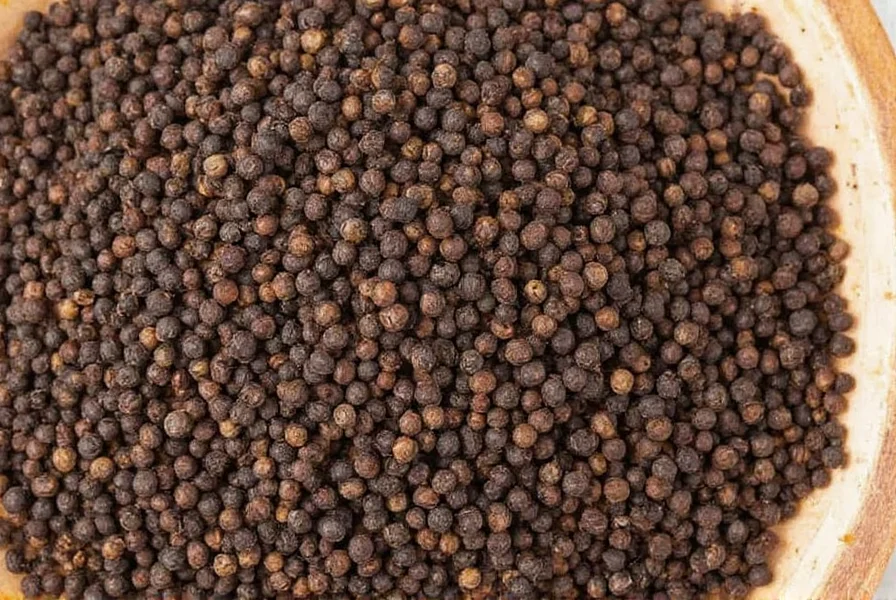Understanding the nuances of ground black pepper helps home cooks and professional chefs maximize its potential in everyday cooking. This versatile spice has distinct advantages and limitations compared to its whole counterpart, affecting everything from flavor intensity to shelf life.
What Exactly Is Ground Black Pepper?
Ground black pepper originates from the Piper nigrum plant's unripe fruit, which is cooked and dried to create black peppercorns. These dried berries undergo mechanical grinding to produce the fine powder found in most kitchen shakers. The grinding process exposes more surface area, releasing volatile compounds like piperine that give black pepper its characteristic heat and aroma.
Commercial production typically involves stainless steel mills that control particle size. Finer grinds work best for rubs and marinades, while medium grinds suit general cooking applications. Artisanal producers sometimes use stone grinding, which generates less heat and better preserves volatile flavor compounds.
Flavor Profile and Culinary Characteristics
Ground black pepper offers a complex flavor profile featuring:
- Immediate pungency from released piperine
- Woody, floral notes from terpenes
- Subtle citrus undertones
- Mild heat that builds gradually
The grinding process creates a more uniform flavor distribution compared to whole peppercorns. This makes ground black pepper ideal for applications requiring consistent seasoning throughout a dish. However, the increased surface area also accelerates oxidation, causing flavor degradation within 4-6 months when improperly stored.
Ground Black Pepper vs. Whole Peppercorns
| Characteristic | Ground Black Pepper | Whole Peppercorns |
|---|---|---|
| Flavor Release | Immediate upon application | Gradual during cooking |
| Shelf Life | 4-6 months (properly stored) | 2-3 years |
| Best For | Dry rubs, finishing dishes, baking | Soups, stews, pickling |
| Flavor Complexity | Consistent but less nuanced | More complex as it cooks |
| Convenience | Ready to use | Requires grinding |
Optimal Culinary Applications for Ground Black Pepper
Chefs reach for ground black pepper when they need precise, immediate seasoning. The best ground black pepper for cooking applications include:
Dry Rubs and Marinades: The fine particles penetrate meat surfaces more effectively than whole peppercorns, creating deeper flavor integration. Combine with salt, garlic powder, and paprika for steak rubs.
Baking and Pastry: Essential in recipes like cheese straws, black pepper crackers, and even some chocolate desserts where consistent distribution matters. The ground black pepper flavor profile complements both savory and sweet applications.
Finishing Dishes: A light sprinkle over roasted vegetables, soups, or eggs provides instant flavor enhancement without cooking time. This technique preserves volatile aromatic compounds that would otherwise dissipate during prolonged heating.
Proper Storage Techniques for Maximum Freshness
To extend the ground black pepper shelf life, follow these storage guidelines:
Store in an airtight container away from light and heat sources. Dark glass or opaque containers preserve flavor compounds better than clear plastic. The ideal storage temperature is below 70°F (21°C) with low humidity. Avoid storing near the stove or oven where temperature fluctuations occur.
For long-term storage, consider dividing your supply into small portions and keeping the majority in the freezer. Cold temperatures significantly slow oxidation. When properly stored, high-quality ground black pepper maintains acceptable flavor for 4-6 months, though peak freshness occurs within the first 8 weeks.
Common Mistakes When Using Ground Black Pepper
Many home cooks make these critical errors with ground black pepper:
Over-shaking containers: Most standard shakers dispense 3-5 times more pepper than needed. Instead, tap the container gently or use your fingers to control portions.
Using old spice: Stale ground pepper loses its aromatic compounds, resulting in flat flavor. Check freshness by rubbing a small amount between your fingers - fresh pepper should release a noticeable aroma.
Adding too early in cooking: For maximum flavor impact, add ground black pepper during the last 5-10 minutes of cooking. Extended heat exposure diminishes volatile flavor compounds.
When You Run Out: Suitable Substitutes
If you need ground black pepper substitutes, consider these options:
White pepper provides similar heat with earthier notes, though it lacks black pepper's complexity. Cayenne pepper offers heat but with different flavor characteristics. For the closest approximation, crush whole peppercorns in a mortar and pestle until fine - this creates freshly ground pepper with superior flavor to pre-ground versions.
Remember that pre-ground alternatives like chili powder or cayenne won't replicate black pepper's unique flavor profile. They can provide heat but lack the complex woody, floral notes that make black pepper distinctive.

Maximizing Flavor in Everyday Cooking
To get the most from your ground black pepper for cooking, follow these professional techniques:
Always measure rather than eyeball quantities, especially in baking where precision matters. For salad dressings and vinaigrettes, add ground pepper directly to the oil mixture rather than sprinkling on finished salads - this ensures even distribution.
When making sauces or soups, add ground black pepper during the final stages of cooking. The volatile compounds responsible for black pepper's distinctive aroma begin dissipating after just 15 minutes of simmering. For cold applications like mayonnaise-based salads, allow 15-20 minutes for flavors to meld after mixing.
Consider pairing ground black pepper with complementary ingredients: lemon zest enhances its citrus notes, while olive oil helps distribute the flavor compounds evenly throughout dishes.

Frequently Asked Questions
Does ground black pepper lose potency over time?
Yes, ground black pepper loses potency significantly faster than whole peppercorns due to increased surface area exposure. Properly stored in an airtight container away from light and heat, it maintains acceptable flavor for 4-6 months, though peak freshness occurs within the first 8 weeks. The volatile compounds responsible for its characteristic aroma and heat dissipate through oxidation once ground.
Can I substitute ground black pepper for whole peppercorns in recipes?
You can substitute ground black pepper for whole peppercorns, but use approximately half the amount since ground pepper delivers more immediate and concentrated flavor. For every teaspoon of whole peppercorns called for in a recipe, use 1/2 teaspoon of ground black pepper. Note that this substitution works best for finishing dishes or dry rubs, not for long-cooking applications where whole peppercorns would gradually release flavor.
Why does my ground black pepper sometimes taste bitter?
Bitterness in ground black pepper usually indicates one of three issues: the pepper is stale and has oxidized, it was exposed to excessive heat during cooking, or it contains fillers. Freshly ground pepper should have a sharp, pungent flavor without bitterness. To prevent bitterness, add ground black pepper during the last 5-10 minutes of cooking and store it properly in an airtight container away from heat and light.
Is freshly ground pepper significantly better than pre-ground?
Yes, freshly ground pepper offers noticeably superior flavor. The grinding process releases volatile aromatic compounds that begin dissipating immediately. Pre-ground pepper loses up to 80% of its volatile compounds within the first month of grinding. For optimal flavor, grind peppercorns immediately before use, especially for finishing dishes where the pepper's aroma is most prominent.
What's the best container for storing ground black pepper?
The best containers for ground black pepper are airtight, opaque, and made of glass or ceramic. Dark glass containers preserve flavor compounds better than plastic by blocking light exposure. Avoid clear containers or metal tins that may react with the spice. For extended storage beyond 6 months, divide your supply and keep the majority in the freezer in a vacuum-sealed container to significantly slow oxidation.











 浙公网安备
33010002000092号
浙公网安备
33010002000092号 浙B2-20120091-4
浙B2-20120091-4